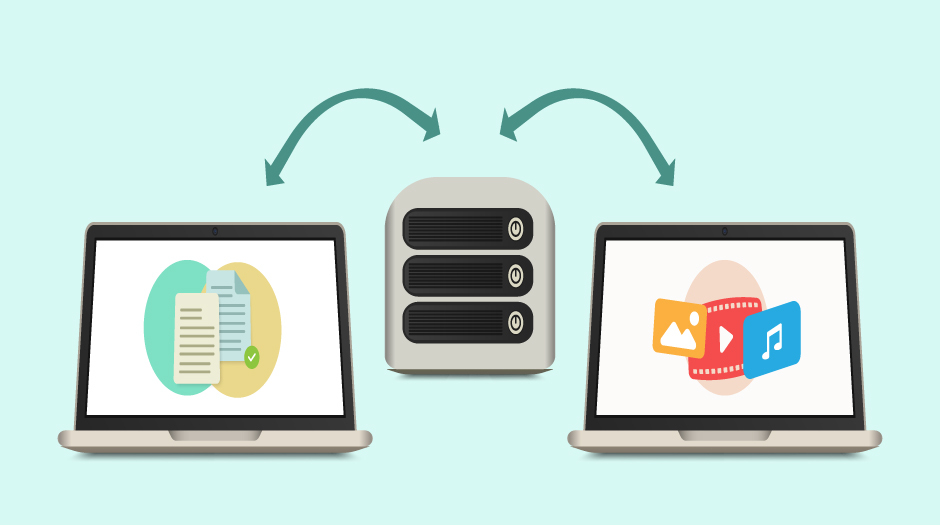Making a business plan, and picking between shared and dedicated hosting is like those two choices. That being said, you will need to set a budget, look at your available resources, and choose who you want to reach. Choosing a web hosting plan is an exciting chance that could be very good for your business. Picking the right web hosting service for your site will make it faster, safer, and able to grow as needed. This will make sure that your online presence runs smoothly and effectively. By making the right choice, you can improve the user experience, speed up your website, and help your company grow.
First, let’s look at two of the most common types of web hosting: shared hosting and dedicated hosting. Here, we’ll talk about what they are, the pros and cons of each, and some of the biggest differences between them so that you can choose the best hosting choice for your business.

What shared hosting is?
Shared hosting is a type of web hosting service where several websites share the same physical server and its tools. The resources for your website will be shared with other websites that are housed on the same server if you use shared hosting. The central processing unit (CPU), memory, storage room, and bandwidth are some of these resources. If you choose shared hosting, these tools will be shared by your website. In the next few lines, we’ll talk about the pros and cons of shared hosting.
Who utilizes shared hosting services?
Website owners looking for a user-friendly and cost-effective solution should look into shared hosting. Shared hosting solutions can assist a wide range of organizations, from personal initiatives to small corporations and even medium-sized businesses. The disadvantages are minimal as long as the server is protected by reliable security measures and the website traffic is not excessive. When shared hosting is employed, there are backup hosting options available in case websites exceed the resources given to them. Moving a website from one hosting environment to another is a simple process that will not jeopardize the effectiveness of your website under any circumstances.
The following are some of the benefits of shared hosting:
- Low Costs
To a large extent, the popularity of shared hosting can be attributed to the inexpensive cost of using it. It is possible for a single server’s many users to share the costs of maintaining the server, which results in lower charges for each individual customer. Another option is to spend a higher price to upgrade to a hosting service that can handle a greater volume of traffic and resources.
- The required level of technical expertise is low
The fact that shared hosting does not require any technical ability or knowledge of servers is one of the reasons why so many individuals begin their websites with it. Shared hosting solutions come with a control panel that makes website maintenance extremely simple, as well as pre-installed applications that are suitable for the majority of common websites. In order for you to concentrate on expanding your company, the host providers will take care of the server maintenance, which includes the installation of updates and patches.
What dedicated hosting mean?
Dedicated hosting differs from shared hosting in that it provides your website with access to its own physical server and all of its resources. To put it another way, a dedicated hosting plan gives you complete control over the server’s resources, including its performance and security. Even if you are still renting the server from a hosting company, the decisions you make about how to use and maintain it are almost entirely up to you. The following are the advantages and disadvantages of dedicated hosting.
What kinds of consumers use dedicated hosting?
The use of dedicated hosting is highly recommended for businesses that have specific specifications and significant bandwidth requirements. Because dedicated hosting offers a higher level of protection, large organizations, for instance, which have a great deal of valuable data, can find it more advantageous to make an investment in this technology. Furthermore, those who possess the necessary level of technical expertise to take advantage of the customization are offered rewards.
The following are some of the advantages of dedicated hosting:
- Absolutely every single one of the server’s resources is being employed
A dedicated hosting solution not only eliminates the chance of server sharing, but it also reduces the likelihood of bad neighbor effects. Dedicated hosting removes both of these potential issues. This means that your website is able to make full use of the processing power, memory, and disc space that your server is capable of providing. Additionally, when another user uses your server, they do not have the ability to potentially expose your website to cyber dangers or cause the IP address of your server to be banned.
- Ability to personalize one’s experience
Because dedicated hosting permits a great deal of modification, you have the opportunity to optimize the settings of your server when you go with this type of hosting. In addition to this, it provides you with root access, which lets you to make modifications to the code of program installations. In cases in which a website requires a specific application, the configuration of a server is often considered to be of great value.
A brief overview of comparative analysis-
In the following summary, we will compare and contrast shared and dedicated hosting in terms of several features of their services.
- Flexibility and adaptability
Shared hosting does not allow for customizing because any changes made to the backend will affect all of the websites housed on the shared server. However, this is the level of personalization offered with various hosting options. Some hosting plans allow for greater flexibility in the services allocated to shared hosting customers, such as additional FTP users or cloud storage. Dedicated hosting allows you complete customization. Because you do not have to share the server with any other websites, you can choose the operating system, tailor the environment to run certain apps and optimize the amount of bandwidth and memory that you require.
- Cost
When it comes to cost, shared hosting emerges as the obvious winner, making it the most affordable option. The cost of shared hosting can range anywhere from around one dollar to twenty dollars per month, however the cost of dedicated hosting can be much greater than three hundred fifty dollars, depending on the package. There is a possibility that dedicated hosting will incur additional fees in the event that the server encounters a serious problem that requires the web host’s assistance in order to resolve it.
- Assurance of safety
When compared to dedicated hosting, shared hosting plans are typically more vulnerable to cyberattacks. This is because shared hosting plans are smaller in size. This is due to the fact that the server is shared by several users, which results in an increased number of opportunities for security risks. If you are concerned about the server’s physical security, you should make sure that your website is hosted by a professional hosting business that has a good reputation and someone you can trust. This will secure the server from being damaged or broken into.
- Require technical expertise
Among the many hosting options, shared hosting is the one that demands the least bit of effort. Because the server is shared by a lot of users, the hosting company is responsible for controlling and maintaining practically all aspects of the server. This is because the server is shared.
Because the bulk of the benefits of dedicated hosting are based on the implementation of administrative procedures, it is conceivable for parties that have insufficient technical knowledge to be unable to afford dedicated hosting.
Comparison of shared hosting and dedicated hosting-
When you choose shared hosting, your website will coexist with other websites that are hosted on the same server as you. All of these websites will be neighbors. One of the benefits of dedicated hosting plans is that your website will have its own dedicated server. There are unique benefits and drawbacks associated with both of these options. In order to select the most suitable alternative for your company, it is important to acquire knowledge regarding the distinction between shared hosting and dedicated hosting.
Conclusion-
If you choose your web hosting plan carefully, you will be able to save a significant amount of money and time. Using shared hosting can help you save money if you do not require a significant amount of memory, processing power, bandwidth, or control over your website. If your team is capable of efficiently administering a certain hosting arrangement and your website requires a significant amount of server resources, you should consider switching to dedicated web hosting instead. VPS hosting is the best option for your website if it falls somewhere in the middle.


